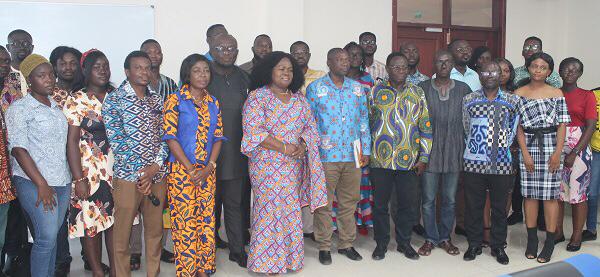The Directorate of Research, Innovation and Development (DRID) at the Ghana Institute of Journalism (GIJ) has held its third inter-faculty lecture.
This is part of the efforts to promote research culture in Ghana.
The event which took place on September 23, had in attendance senior lecturers of the Institute, invited guests as well students.
Acting Dean of the Faculty of Public Relations, Advertising and Integrated Marketing, Dr Mavis Essandoh, delivered a presentation on the topic, ‘Fighting ‘real’ fire? – A case study of two Ghanaian crisis management organisations’.
In her presentation, she noted that organisations such as the Ghana National Fire Service (GNFS) and National Disaster Management Organisation (NADMO) are riddled with myriads of challenges including logistical constraints.
She said such challenges have over the years contributed to some of the organisations’ ineffectiveness which has caused a cross-section of the public to hold a negative perception of the two crisis response organisations.

On matters relating to communications, the GIJ senior lecturer intimated that the two organisations should re-strategise in order to better serve the populace with much-needed information to prevent or handle disasters.
“They have some communication in place but probably it was not enough and, given the recent spate of disasters, maybe they have to re-strategise in communicating with the average Ghanaian.
“They may have to focus more of their efforts on pre-crisis communication rather than post-crisis communication,” she remarked in an interview.
Meanwhile, the Research Directorate has indicated its readiness to organise regular research seminars for staff of the institution to share their projects.
The move – according to the head of DRID, Dr Etse Sikanku – is to serve as an avenue for lecturers to disseminate the findings of their works to the university community and the general public at large.
Dr Sikanku underscored the need for such regular seminars in academia to “stimulate intellectual atmosphere, foster and build good research environment and influence decisions at the national level.”
He observed with concern that in the absence of such events, research works of academicians only end up in the libraries.
“That is the goal of this programme, to link academia with the public. Without programmes like this, all the research that we do is left in the lecture theatres, it is left in the libraries, it is left on the shelves.
“But at programmes like this, it serves as a form of research dissemination to the university community and the general public.
“So the information, the contributions, the findings that are made will then inform policies at the national level and improve professional practice at the wider level,” he said.
Other senior lecturers who were at Dr Mavis Essandoh’s presentation backed suggestions for more such seminars.
Professor Eric Opoku Mensah, chairman of the occasion and Deputy GIJ Rector, opined that staff who were pursuing PhD programmes could share either some bit of their literature review or works at such events “to test some ideas even before you go to your departments for them to ask the difficult question.”
He further posited that the inter-faculty research seminar could be held once a month.





